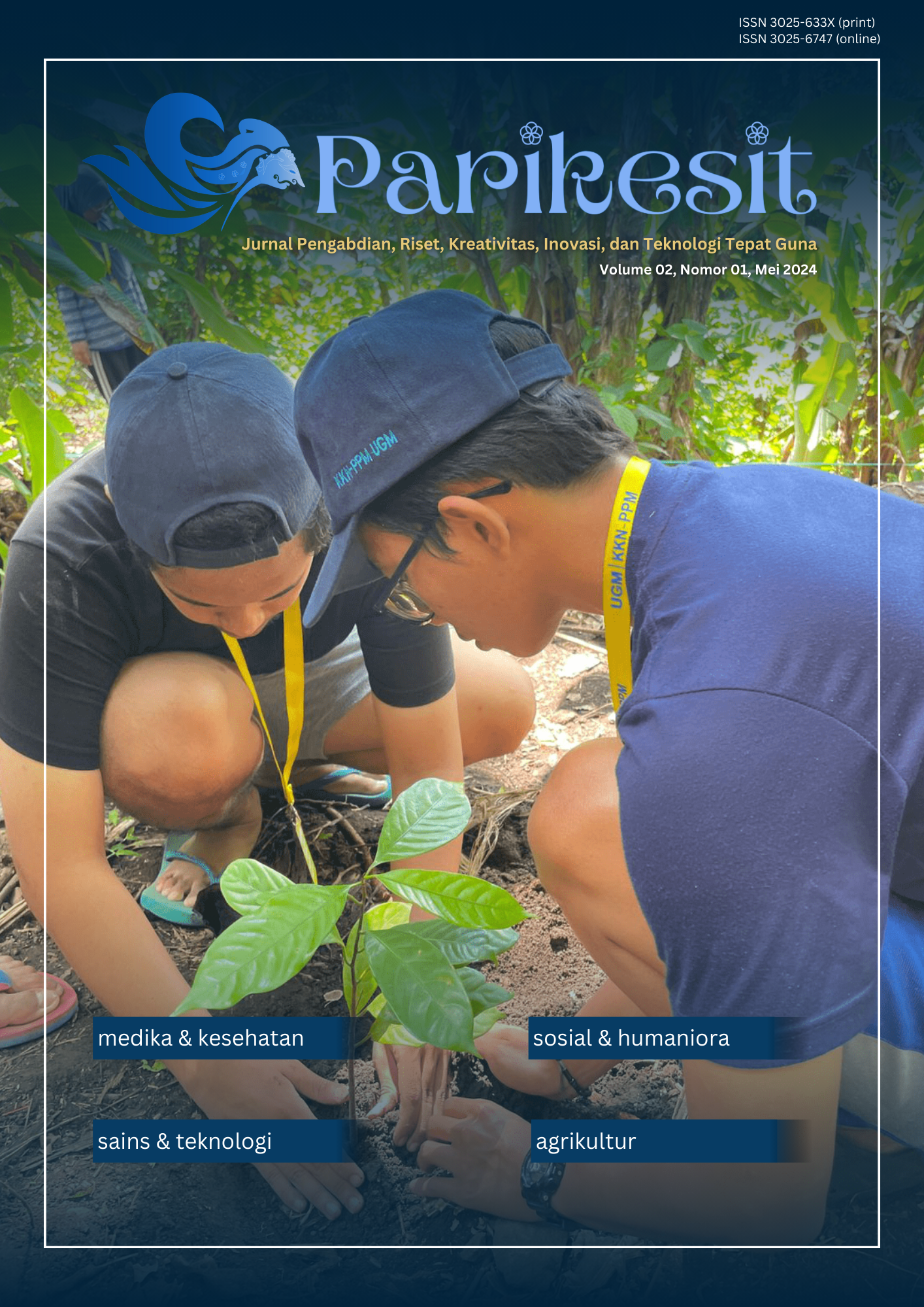Dolalak Dance Training as an Effort to Fulfill Children's Subjective Well Being in Children in Awu-Awu Village, Ngombol District, Purworejo Regency
Abstract
Tari Dolalak is a traditional folk art from Purworejo that incorporates a blend of dance movements, musical accompaniment, and choral singing. It can be performed by both men and women, either in groups or as pairs. The Universitas Gadjah Mada Community Empowerment Learning Team (KKN-PPM UGM) discovered that the youngsters of Awu-Awu State Elementary School (SDN) expressed a keen interest in learning and practicing Tari Dolalak. Nevertheless, there are restrictions on accessing it due to the school's lack of organised extracurricular activities. Consequently, the team endeavoured to address the children's requirements by collaborating with Tut Wuri Dance Studio, as dance is a means of self-expression and has the potential to impact an individual's subjective well-being. This study employs descriptive qualitative methodologies and utilises descriptive analysis to examine the data, specifically focusing on the various aspects of Children Subjective Well Being. These aspects encompass positive emotions, negative emotions, satisfaction with specific subjects, and overall life satisfaction. Tari Dolalak serves as a medium for children to comprehend positive and negative emotions, including happiness, comfort, courage to perform, sadness, disappointment, and anger. This enables them to cultivate supportive and communicative relationships with their peers, trainers, and the UGM KKN-PPM team. Additionally, dance training empowers children to identify and explore their needs and interests.
References
Afifah, N. N. (2020). Jinemnem [Skripsi]. Institut Seni Yogyakarta. http://digilib.isi.ac.id/6251/1/BAB%20I.pdf
Amelia, R., & Pramutomo, R. M. (2021). The Dolalak Dance of Purworejo Regency Central Java: A changing performance as entertainment. International Journal of Innovation, Creativity and Change, 15(8), 941—956.
Budiman, L., Suwartiningsih, S., & Krisnawati, E. (2019). Pergeseran makna bentuk sajian Tarian Dolalak Mlaranan periode 1980 –2015. Cakrawala Jurnal Penelitian Sosial.
Campbell, A. (1976). Subjective measures of well-being. American Psychologist, 31(2), 117–124. https://doi.org/10.1037/0003-066X.31.2.117
Diener, E. (1984). Subjective Well-Being. Psychological Bulletin, 95(3), 542—575. https://ssrn.com/abstract=2162125
Dinisman, T., & Ben-Arieh, A. (2016). The characteristics of children’s Subjective Well Being. Social Indicators Research, 126(2), 555—569. https://doi.org/10.1007/s11205-015-0921-x
Fadhilah, U. (2019). Subjective Well Being pada Penari Jaranan New Putra Askada [Skripsi]. IAIN Kediri. http://etheses.iainkediri.ac.id/1083
General Assembly of the United Nations. (1989). Promotion and protection of the rights of children; follow-up to the outcome of the special session on children. United Nations. https://www.un.org/en/ga/62/plenary/children/bkg.shtml
Gilman, R., & Huebner, S. (2003). A review of life satisfaction research with children and adolescents. School Psychology Quarterly, 18(2), 192–205. https://doi.org/10.1521/scpq.18.2.192.21858
Hapsari, L. (2016). Studi deskriptif mengenai Subjective Well Being pada warga usia dewasa madya di kawasan padat penduduk RT 09/ 09 Cicadas Sukamulya Kelurahan Cibeunying Kidul Kota Bandung [Skripsi]. Universitas Islam Bandung. http://repository.unisba.ac.id/handle/123456789/5331
Heksantoro, R. (2019). Potret Purworejo sambut kunjungan wisata 2020 pakai Tari Dolalak. Detik Travel. https://travel.detik.com/fototravel/d-4708244/potret-purworejo-sambut-kunjungan-wisata-2020-pakai-tari-dolalak/1
Klocke, A., Clair, A., & Bradshaw, J. (2013). International variation in Child Subjective Well Being. Child Indicators Research, 7(1), 1—20. https://doi.org/10.1007/s12187-013-9213-7
Marwasta, D., & Firmansyah, C. (2023). Peningkatan ekonomi masyarakat Kecamatan Cigugur, Kuningan, Jawa Barat. Jurnal Pengabdian, Riset, Kreativitas, Inovasi, dan Teknologi Tepat Guna, 1(1), 23—30. http://doi.org/10.22146/parikesit.v1i1.7965
Mujamiasih, M., Prihastuty, R., & Hariyadi, S. (2013). Subjective Well Being (SWB): Studi indigenous karyawan bersuku Jawa. Journal of Social and Industrial Psychology, 2(2), 36–42.
Nurbaidah, A. G., Nurhadi, & Pranawa, S. (2020). Differrences in the meaning Dolalak Dance in Purworejo Districk, Central Java Province. Jurnal Ilmu Sosial Mamangan, 9(1), 39—47.
Park, N. (2004). The role of Subjective Well-Being in positive youth development. The Annals of the American Academy of Political and Social Science, 591(1), 25—39. http://doi.org/10.1177/0002716203260078
Prihatini, & Sri, N. (2000). Perkembangan kesenian Dolalak di Kabupaten Purworejo Jawa Tengah 1968—1999 [Tesis]. Universitas Udayana.
Rachmawati, P., & Prihatini, N. S. (2019). Unsur penggarapan Tari Dolalak Lentera Jawa II karya Melania Sinaring Putri. Jurnal Seni Budaya, 17(2), 103—113.
Raco, J. (2018). Metode penelitian kualitatif: Jenis, karakteristik dan keunggulannya. Grasindo.
Saryani. (2022). Strategi pelestarian dan pengembangan kesenian Tari Dolalak sebagai daya tarik wisata dalam upaya mewujudkan ketahanan budaya di Kabupaten Purworejo. Jurnal Ketahanan Nasional, 28(2), 185—198.
Setyawan, A. (2016). Kesenian Tari Dolalak sebagai brand Kabupaten Purworejo, Jawa Tengah. Kalatanda : Jurnal Desain Grafis Dan Media Kreatif. https://doi.org/10.25124/kalatanda.v1i2.1373
Sugiyono. (2013). Metode penelitian kuantitatif, kualitatif, dan R&D. Alfabeta.
UNICEF. (2021). Global insight understanding Child Subjective Well Being. UNICEF. https://www.unicef.org/globalinsight/media/2116/file/UNICEF-Global-Insight-Understanding-Child-Subjective-Wellbeing-2021.pdf
Zed, M. (2008). Metode penelitian kepustakaan. Yayasan Obor Indonesia.
Copyright (c) 2024 Jurnal Pengabdian, Riset, Kreativitas, Inovasi, dan Teknologi Tepat Guna

This work is licensed under a Creative Commons Attribution-ShareAlike 4.0 International License.




